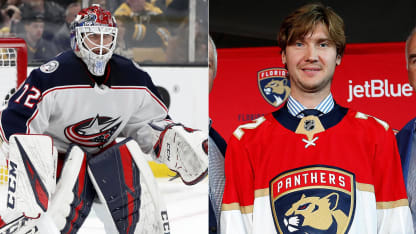Signing with a new team means a lot of adjustments, from a new goaltending coach, to new defensive systems and reads, to new puck-handling and communication preferences with new defensemen.
Calgary Flames goaltending coach Jordan Sigalet knows about those adjustments more than most, having worked with seven incoming goalies acquired in trades or as free agents over five seasons with Calgary. Cam Talbot, who signed a one-year contract with the Flames on July 1, will be the eighth goaltending transition Sigalet oversees in Calgary.
RELATED: [NHL Free Agent Tracker]
"It's definitely an adjustment, but what's nice about free agency is you have the summer to start building that relationship and trust," Sigalet said. "As soon as we signed Talbot, you are on the phone and starting to learn about each other, what the goalie likes, what his needs are on a daily basis, so you can prepare what you are going to do for that goalie. Most are flexible, and a lot have similar needs, so it's not a vast difference, but you can do a lot with a conversation, going over video and setting goals over the summer, identifying and agreeing on what they need to target or change in their game to make them more successful on your team."
The number of changes varies depending on the goalie, goaltending coach and team, and the factors that determine the ease of transition are similar to those when changing teams at the NHL Trade Deadline. They include whether a goalie's style and strengths match the defensive system and types of scoring chances his new team allows (rush vs. in zone), the number of shots on goal a team allows (some struggle to focus when they're not busy enough), whether they have played in the same conference or division recently, how insistent a new goaltending coach is on technical changes, and whether the goalie has been through it all before.
New Chicago Blackhawks goalie Robin Lehner certainly has.
Lehner, who signed a one-year contract with Chicago on July 1, experienced the extremes of change last season after joining the New York Islanders on a one-year contract following three seasons with the Buffalo Sabres. His move to New York checked a lot of boxes: a new team in a different division with a new coach and system that altered the types and number of shots he faced, and goaltending director Mitch Korn and goaltending coach Piero Greco asking for significant adjustments to how he played.
It helped that the structure new coach Barry Trotz brought to the Islanders simplified the reads Lehner had to make behind his new defense, a big part of changing teams, and reduced the number of odd-man rushes he faced compared to with the Sabres.
"Reading off the structure here is easier, definitely," Lehner said in early March.

